Wednesday Walk: Is Bigger Better?
Looking at regional grocery chains, books from my podcast, and smoking some peppers
Welcome to Willoughby Hills!
Every Wednesday, I offer a few short ideas that I hope will inspire you to do some more reading, thinking, and exploring. Let’s take a little walk together and see where the path leads…
Reflecting on the Path
In life, it’s so easy to get focused on the path right in front of us that sometimes we forget to stop and really think about how far we’ve come.
I started my podcast more than four years ago now, and it can be very easy to get caught up in the daily details: the pitching of guests, the scheduling of interviews, the editing and publishing of episodes. It’s a rare treat to stop and be reminded of what all of that day to day tasks have yielded and how they have shaped who I am now.
We were in a local public library over the weekend and I saw a book that I recognized on a display for World Tourism Day (September 27- mark your calendars, and also try to ignore the doll collection in the photo below…). The book was A World Together by Sonia Manzano, who played Maria on Sesame Street.
I couldn’t quite place why I knew the book so well until I remembered that I had interviewed Sonia for this book’s release way back in 2021. It was a special conversation at the time, but one that I nearly forgot had happened!
Just down the aisle from Sonia’s book was one from a more recent guest on the podcast from this year, Sarah Soonling-Blackburn who wrote the incredible Race to the Truth book Exclusion and the Chinese American Story.
When I was in Barnes and Noble the other day (a place that I first rediscovered in 2022 and it felt like a 90s time capsule), I was equally excited to see books by Taylor Lorenz and Tracie McMillan also featured in the New Release section.
This week will mark 131 episodes of this podcast, a passion project that I originally envisioned as a 10 part series at the height of the pandemic. While I have certainly developed a process and now feel more comfortable with the role of podcast host and producer, there’s still a unique challenge and learning opportunity with each episode that I release.
This week’s episode is especially exciting for me. My guest is podcaster, comedian, and author Akilah Hughes. Her new podcast Rebel Spirit is about her quest to change the mascot of her Northern Kentucky high school’s mascot from the Rebels to the Biscuits.
This is a topic near and dear to my heart, because (as I’ve written about before), I was also a Rebel in high school, as in, my high school adopted the Rebel name and at one time even flew the Confederate flag at football games! In Northeast Ohio, a state firmly in the Union during the Civil War. Yeah…
The latest episode with Akilah is an absolute treat for me and was a cathartic conversation in a lot of ways. You’ll be able to hear it tomorrow on all podcast platforms. If you’re a paying member, you have access to the episode right now (and early access to all podcast episodes).
If you’re not yet a paying member, maybe hearing my conversation with Akilah will be enough to entice you to upgrade. This newsletter and podcast are a labor of love, so any financial contributions to help offset the costs are always welcome and appreciated!
How to Beat Wal-Mart
I recently spoke with Austin Frerick on the podcast about consolidation in the food industry. One of the biggest parts of our conversation centered on how Wal-Mart has become a behemoth in the grocery industry, capturing roughly 1/3 of every dollar spent on groceries in America.
Even if you don’t shop at Wal-Mart, Wal-Mart buyers and policies affect the food you’re eating.
For many grocery chains, one way to combat Wal-Mart has been growth through mergers and acquisitions. I’ve written about this phenomenon in the past, saying this in 2023:
“But when you dig into it, the actual ownership of these “local” supermarket brands is more consolidated than it appears, even when familiar names remain in use. Kroger is the parent company of nearly 20 regional brands like Ralphs, Fry’s, and Dillons. Albertsons also owns about 20 brands including Shaw’s, Star Market, Safeway, and Vons. Stop and Shop, Giant, Food Lion, and Hannaford are all owned by Dutch conglomerate Ahold Delhaize. What once started as small, local establishments have become big and national (or even international).”
Kroger and Albertsons are currently in the process of a merger, which would mean even greater consolidation in the industry.
But what if the solution to beating Wal-Mart isn’t to get as big as possible, but rather to densify within a certain market but not expand beyond your local footprint?
Apparently, that has been the key to success for regional chains like Texas’s H-E-B, the Midwest’s Hy-Vee, or the Southern chain Publix, at least according to a new article from J. Edward Moreno for Sherwood:
“H-E-B is known for being hard to compete with. In 2021, Hy-Vee said it was expanding to the South but not in Texas because ‘we just don’t need to go poke that bear,’ in reference to H-E-B. Walmart did exactly that a decade ago with an expansion in Texas, and H-E-B maintained its market share.
‘It was guerrilla warfare,’ [former H-E-B executive Scott] McClelland said in the panel. ‘We did stuff that a big national competitor couldn't, wouldn't, or didn't, and we knew we had an advantage because as Texans we eat differently than people in Arkansas, and we live differently.’”
H-E-B seems especially focused on both local products that national retailers may overlook (Whataburger spicy ketchup), but also it is able to differentiate each store based on local tastes and demographics as well:
“H-E-B merchandises very differently based on location, whereas Walmart merchandises for the average American consumer. As a result, an H-E-B can look drastically different depending on where it’s located.
Some have more premium products than others. An H-E-B in a town by the US-Mexico border may sell fresh tortillas and have signs in Spanish, while a location in a Houston suburb with a large Asian population may rival an H-Mart.”
Moreno’s article also includes some really interesting maps that show store distribution across regions and the U.S.
Reading about H-E-B brought to mind Market Basket, a local New England chain famous for low prices and stores that feel stuck in another era. Seriously, even their brand new stores look like something out of the 1970s.
Market Basket made headlines 10 years ago when its CEO Arthur T. Demoulas was ousted from his job by his cousin. Employees walked off the job in a show of solidarity and customers boycotted the stores. Store shelves sat empty with most employees on the picket line until Arthur was returned as CEO.
After six weeks, Arthur T. Demoulas purchased the chain outright and became CEO again. Workers returned to the job and the stores were busier than ever.
As the 10 year anniversary of those protests passed, Demoulas recently surprised employees with a bonus as a sign of his continued appreciation. According to Boston.com:
“The company declined to share the scope of the bonuses. However, one Reddit user and employee at the company noted that they made close to $3,000 in the latest bonus and that bonuses varied based on an employee’s longevity at the company.”
It seems impossible to imagine Wal-Mart, Kroger, or Albertsons offering such a sizable bonus to staff. Perhaps bigger is not always best.
Smoking Hot
I plan to write about it in more depth someday, but I recently purchased a used smoker off of Marketplace for $40. So far, I’ve made some bone-in chicken thighs and some Indian-style Tandoori chicken legs. I purchased a brisket last week that I’m planning to smoke soon.
Last week when I went to pick up our CSA share, they had pick your own peppers on offer. When I walked through the pepper field, I noticed there were quite a number of very ripe red jalapeños on the vine.
For those that don’t know, jalapeños start off green, but if they’re left to ripen, they can turn red. Those red jalapeños were traditionally smoked and stored as “chipotles” (yes, a chipotle is just a smoked red jalapeño).
Since I now have a smoker, I decided to try my luck with the red jalapeños and picked a good handful. I took them home and added them to my smoker along with an eggplant, which I used to make baba ganoush.
I’m assuming that traditionally the chipotles would smoke over a fire until completely dry, although every recipe I read said that they can be smoked for 3-4 hours and then dried in a dehydrator. I decided to go that route.
Once fully dried, I stemmed and seeded them, then ran them through a food processor until the peppers were pulverized into a powder. This took quite a while.
I placed a funnel over a spice jar and began to scoop the chipotle powder out of the food processor and into the jar for storage. I had quite the harvest. As I was nearing the end though, I bumped the funnel and chipotle dust went spilling out all over the kitchen- on the floors, under the stove, and all over our new white cabinets!
I salvaged what I could and vacuumed and cleaned up the rest.
I added a little bit to the marinade for our chicken tacos last night, hoping that the smokiness would add a nice flavor (but worried that the spice level may be too much for my kids). Nobody seemed to notice any difference in flavor or heat.
It was a lot of effort and time for a spice that seemed to make a marginal difference to dinner at best. And yet I don’t regret trying it out. I love testing out new recipes and methods for making my own food, and I find it especially satisfying when I can even make the ingredients like spices at home.
It would be easy to just buy a jar of spice from the grocery store, but there is something satisfying about making your own that feels very human.
I publish new issues every Wednesday and Sunday. Sign up to always receive the latest issue and support my work:
Other Wednesday Walks
If you’ve missed past issues of this newsletter, they are available to read here.


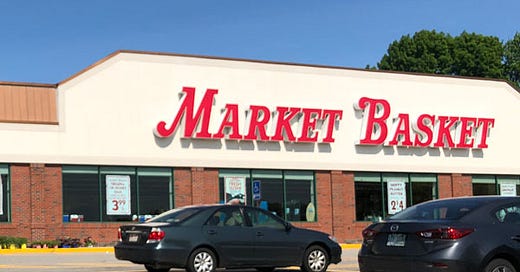



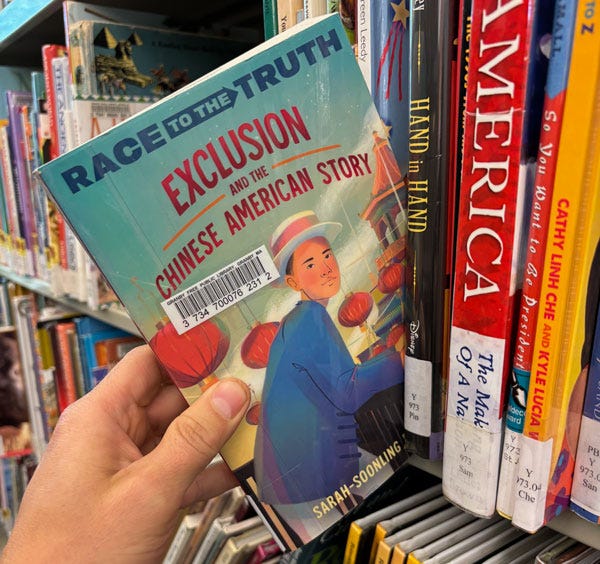

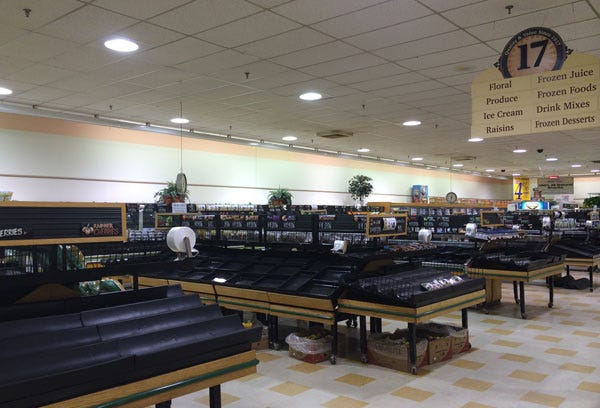
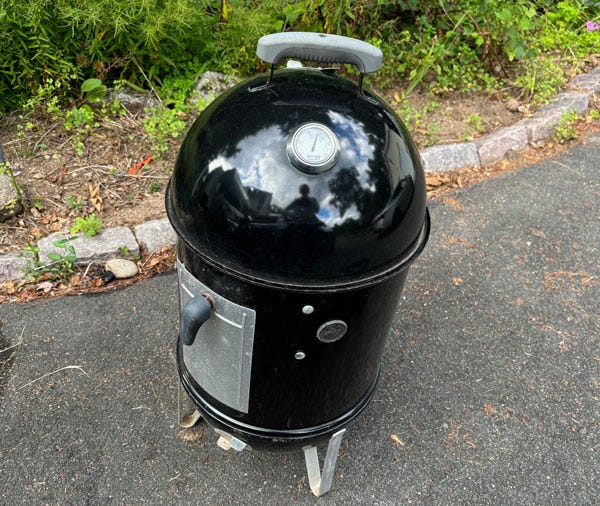
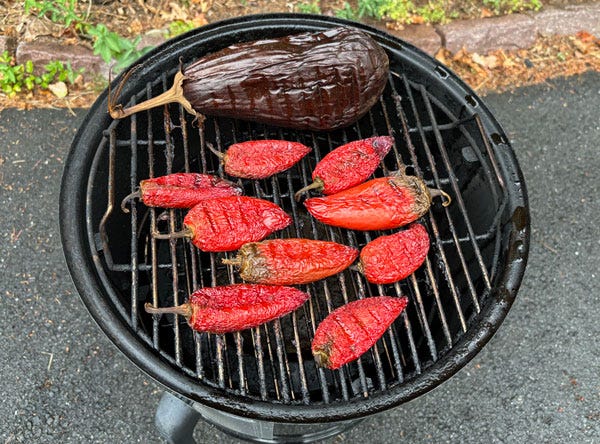
Putting in a shoutout for The Fresh Market, which originated in Greensboro and its still small. I used to work at the front desk of the architecture firm that was their firm of record and can vouch for how tiny and how specific each store is. I also had a panic attack in my local one in Alexandria, Virginia, but only because I was having a stressful day doing Instacart. Also, pre-consolidation, Harris Teeter and Food Lion were also NC stores. And we also have a very distinct food culture, that i even dreamed about missing last night, lol.